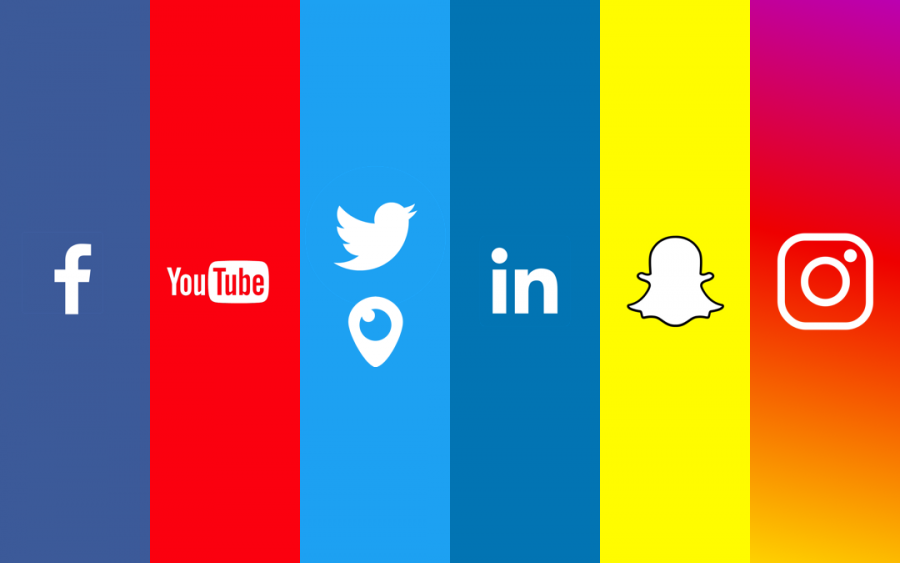The Effects of Social Media on Teens
December 2, 2019
so·cial me·di·a (noun): 1. websites and applications that enable users to create and share content or to participate in social networking. While this might be the dictionary definition from a quick Google search, anyone who has a form of social media knows that there is much more to it than meets the eye. Instagram, Snapchat, Twitter, Facebook, Reddit, YouTube, and even Discord are all influential forms of social media. Social media has its disadvantages and negative effects, but one thing is for sure: as a Righetti student, who prefers to remain anonymous, says, “While social media has influenced my life in a negative way because it deeply plummeted my mental health through bullying, in the same way, social media improved my mental health because I was able to find others who had the same interests and experiences and feel less alone” According to http://brandwatch.com, There are 3.499 billion active social media users and on average, people have 7.6 social media accounts. Of these social media users, the average daily time spent on social is 142 minutes a day. How do these forms of social media affect teenagers?
81% of teenagers felt social media has a positive effect on their lives, based on the previously mentioned study. Positively, social media has a lot to offer. The ability to connect with others, to express oneself, to discover new ideas and create change in the world. These and more are the reasons people enjoy using social media. Another reason why teenagers use social media is to seek validation and acceptance from their peers. When this occurs, there can be a positive effect on teenagers and their lives. Teenagers who use social media can connect with their friends and find out what others are doing. Josiah Perez, head editor of the Legend, says, “I think social media is a great way to keep us connected as people.” Social media allows users to post messages about their own feelings as well as about current events and new ideas. Many also believe that social media can teach teenagers important job skills such as being able to take criticism from others. “Social media definitely helps teens learn to take criticism from strangers without being drawn into a digital dog fight. This can be a real challenge for young minds looking to express themselves, and a valuable lesson to learn before getting a job,” according to Jonas Sickler from ReputationManagement.com. This is very important because, throughout our lives, we will face issues with criticism from our supervisors and co-workers. Another important and positive impact of social media is that charities, such as Mercy Ships and Oceana, are able to spread their messages about saving and impacting our world. Having a positive influence to enlighten others with their message and encourage them to take action, is important and those ideas can be spread to a greater amount of people through posts and accounts. Social media is very beneficial for teenagers in that it can allow people to connect with others, express themselves, share new ideas, teach job skills and allow positive changes in the world.
“Being connected can sometimes be a negative thing. Not being able to skew away from others and the media, in general, could be problematic to one’s mental health,” Perez includes when talking about the negative downsides to social media. As future generations grow into adulthood in a social media and cell phone-centered world, there are many negative effects that not only teens should be aware of. Many of us are aware of the dangerous physical, physiological and financial costs of addictive substances such as drugs, but do we really understand the negative impact of popular social media sites? Often, we do not realize the amount of time we spend on our phones, primarily on social media. Teenagers spend an average of eight hours a day on their phones. That’s longer than an entire Righetti school day, including one through seven periods! Often, teenagers will stay inside on their phones as opposed to participating in physical activity, studying, spending time with friends and family, and doing extracurricular activities. This can lead to severe mental health issues such as depression and anxiety. The decline of a person’s mental state can not only occur from social media by missing out on their daily lives but also through the idealistic images that social media projects to young people. Social media shows young people that the ideal body, face, hair, assets, and life are attainable and cause many to compare themselves. However, these images are not realistic, nor are they real. With over 60 million downloads, Facetune, a popular photo editing app, is used by almost every “social media influencer,” a name given to social media users with a high following who persuade others through the credibility and content they provide. With the standards set high, teenagers are some of the most vulnerable to these kinds of unrealistic beauty goals. Another huge issue is cyberbullying, which occurs more than many of us realize. Cyberbullying and social media are some of the biggest contributing factors to depression in teens. Through harassment, death threats, rude comments, hate and feelings of isolation, social media has resulted in an increase of suicide across the nation and throughout the world. While depression from social media has a greater effect on girls, and in 2015, the suicide rate among teenage girls rose to the highest it had been in forty years, social media can have this effect on anyone. Suicide is an important and considerable public health problem, and the influence of social media has only made it worse. However, it doesn’t have to be that way.
Teaching people about the benefits and the negative effects of social media is important. It allows us to identify the changes that are needed, and the positive influence it can have when it is used as a way to learn and connect with others. Although there will always be parts of social media that have a poor influence, social media sites such as Instagram and YouTube are working to put an end to cyberbullying (To find out more about how to put an end to this epidemic, visit http://stopbulllying.gov). In conclusion, social media has its pros and cons, but it’s up to us to decide how it impacts our world.
If you or someone you know is struggling with suicide, please call the suicide hotline:
1-800-273-8255

